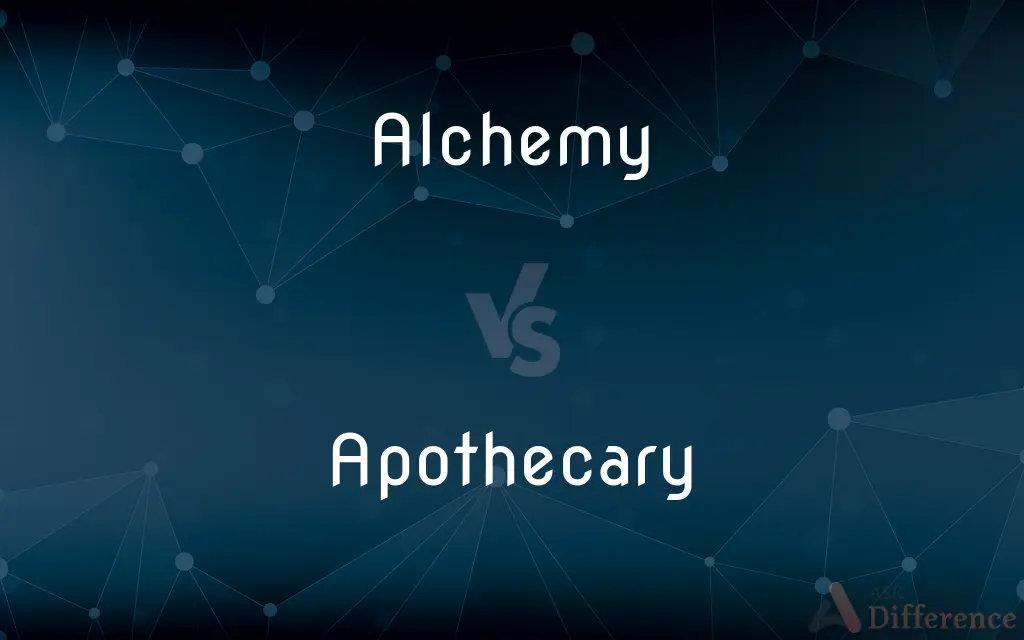Alchemy vs. Apothecary — What's the Difference?
By Tayyaba Rehman & Urooj Arif — Updated on April 5, 2024
Alchemy focuses on the medieval pursuit of transforming base metals into gold and discovering a universal elixir, whereas an apothecary refers to a historical or traditional pharmacist who prepares and sells medicines.

Difference Between Alchemy and Apothecary
Table of Contents
ADVERTISEMENT
Key Differences
Alchemy is an ancient practice combining elements of science, philosophy, and mysticism, primarily aimed at the transmutation of base metals into noble metals like gold and the search for the philosopher's stone, believed to grant eternal youth and health. On the other hand, an apothecary historically referred to a professional who formulated and dispensed medicines to physicians, surgeons, and patients, akin to a modern pharmacist.
The goals of alchemy extended beyond mere chemical transformation; it sought the perfection of matter and spirit, reflecting a deep philosophical underpinning that influenced the development of modern chemistry and psychology. Whereas, the role of an apothecary was more practical and focused on the health and wellbeing of individuals through the preparation of medicinal compounds.
Alchemy’s significance waned with the advent of modern chemistry in the 18th century, as its practices and goals were largely debunked or absorbed into the scientific method. In contrast, apothecaries evolved into the contemporary profession of pharmacy, maintaining their relevance by adapting to the changing understanding of medicine and chemistry.
Practitioners of alchemy, known as alchemists, were often shrouded in secrecy, their work symbolic and encoded in allegory to protect their knowledge and because of the mystical aspects of their pursuits. Apothecaries, however, were integral parts of their communities, offering tangible medical advice and remedies, and their practices were based on empirical knowledge and the materia medica available at the time.
While alchemy and apothecaries both dealt with the transformation of substances, their intentions diverged significantly. Alchemy pursued profound secrets of existence and the universe, symbolizing a quest for spiritual enlightenment and immortality. Apothecaries served a community health role, using their knowledge of herbs, minerals, and substances to treat ailments and improve the physical health of their patrons.
ADVERTISEMENT
Comparison Chart
Definition
An ancient practice focused on the transmutation of materials and discovery of universal cures.
A historical term for a professional who prepares and sells medicinal drugs.
Primary Goal
To transform base metals into noble metals and discover the elixir of life.
To prepare, compound, and dispense medicinal drugs for healing purposes.
Historical Role
Philosophical and mystical pursuit blending science and spirituality.
Practical and medicinal, providing healthcare solutions and remedies.
Evolution
Gave way to modern chemistry and psychology.
Evolved into the modern profession of pharmacy.
Community Role
More isolated and secretive due to the mystical and experimental nature of their work.
Integral to community health, offering remedies and medical advice.
Compare with Definitions
Alchemy
The quest for the philosopher's stone, a mythical substance believed to enable the transmutation of metals.
The legend of the philosopher's stone was a central myth in alchemy.
Apothecary
In historical contexts, an apothecary might also perform medical treatments.
In the absence of a doctor, the apothecary treated common illnesses.
Alchemy
The pursuit of discovering a universal cure for disease.
Alchemists searched for an elixir that could cure all illnesses.
Apothecary
A practitioner who advises on matters of food and diet.
The apothecary recommended herbal teas for his digestive issues.
Alchemy
A medieval chemical science and speculative philosophy aiming to achieve the transmutation of the base metals into gold.
The alchemist spent years attempting to turn lead into gold.
Apothecary
A person who prepared and sold medicines in past centuries.
The village apothecary provided remedies for all sorts of ailments.
Alchemy
An early form of chemistry, with philosophical and magical associations.
Alchemy’s experiments laid the groundwork for modern chemical processes.
Apothecary
A pharmacist or pharmacy, especially a traditional one.
She visited the apothecary to fill her prescription.
Alchemy
A power or process of transforming something common into something special.
The chef’s use of spices was like alchemy, turning simple ingredients into delicious dishes.
Apothecary
A store or shop where medicinal and other health-related products are sold.
The apothecary’s shelves were lined with jars of herbs and potions.
Alchemy
Alchemy (from Arabic: al-kīmiyā; from Ancient Greek: khumeía) is an ancient branch of natural philosophy, a philosophical and protoscientific tradition that was historically practiced in China, India, the Muslim world, and Europe. In its Western form, alchemy is first attested in a number of pseudepigraphical texts written in Greco-Roman Egypt during the first few centuries CE.Alchemists attempted to purify, mature, and perfect certain materials.
Apothecary
Apothecary () is one term for a medical professional who formulates and dispenses materia medica (medicine) to physicians, surgeons, and patients. The modern chemist (also known as a pharmacist in American English) has taken over this role.
Alchemy
The medieval forerunner of chemistry, concerned with the transmutation of matter, in particular with attempts to convert base metals into gold or find a universal elixir
Occult sciences, such as alchemy and astrology
Apothecary
A person who prepared and sold medicines and drugs.
Alchemy
A medieval chemical philosophy having as its asserted aims the transmutation of base metals into gold, the discovery of the panacea, and the preparation of the elixir of longevity.
Apothecary
One that prepares and sells drugs and other medicines; a pharmacist.
Alchemy
A seemingly magical power or process of transmuting
"He wondered by what alchemy it was changed, so that what sickened him one hour, maddened him with hunger the next" (Marjorie K. Rawlings).
Apothecary
See pharmacy.
Alchemy
(uncountable) The premodern and early modern study of physical changes, particularly in Europe, Arabia, and China and chiefly in pursuit of an elixir of immortality, a universal panacea, and/or a philosopher's stone able to transmute base metals into gold, eventually developing into chemistry.
The purpose of physical alchemy—as opposed to its various spiritual pursuits—was to treat the supposed leprosity of base metals such as lead, refining and purifying them into gold.
Apothecary
Synonym of pharmacist: a person who sells medicine, especially (historical) one who made and sold their own medicines in the medieval or early modern eras.
Alchemy
(countable) The causing of any sort of mysterious sudden transmutation.
Apothecary
Synonym of pharmacy: an apothecary's shop, a drugstore.
Alchemy
Any elaborate transformation process or algorithm.
Apothecary
(uncommon) A glass jar of the sort once used for storing medicine.
Alchemy
An imaginary art which aimed to transmute the baser metals into gold, to find the panacea, or universal remedy for diseases, etc. It led the way to modern chemistry.
Apothecary
One who prepares and sells drugs or compounds for medicinal purposes.
Alchemy
A mixed metal composed mainly of brass, formerly used for various utensils; hence, a trumpet.
Put to their mouths the sounding alchemy.
Apothecary
A health professional trained in the art of preparing and dispensing drugs
Alchemy
Miraculous power of transmuting something common into something precious.
Kissing with golden face the meadows green,Gilding pale streams with heavenly alchemy.
Alchemy
A pseudoscientific forerunner of chemistry in medieval times
Alchemy
The way two individuals relate to each other;
Their chemistry was wrong from the beginning -- they hated each other
A mysterious alchemy brought them together
Common Curiosities
What distinguishes alchemy from apothecary?
Alchemy is a mystical science aiming for the transformation of materials and discovery of universal cures, while an apothecary is a professional who prepares and dispenses medicines.
Can alchemy be considered a form of early chemistry?
Yes, alchemy is considered an early form of chemistry, blending mystical beliefs with experimental practices that paved the way for scientific methods.
Were apothecaries doctors?
Apothecaries were not doctors, but they played a crucial role in healthcare by preparing and dispensing medicines, and sometimes providing medical advice and minor treatments.
What happened to alchemy and apothecaries?
Alchemy’s mystical and speculative aspects were debunked or absorbed by modern chemistry, while apothecaries evolved into the profession of pharmacy.
How did alchemists and apothecaries acquire their knowledge?
Alchemists often relied on ancient texts, experimentation, and philosophical contemplation, whereas apothecaries gained knowledge through apprenticeships, empirical practices, and studying medicinal substances.
What were the main substances used by apothecaries?
Apothecaries used a variety of substances, including herbs, minerals, and animal parts, based on the medical knowledge and materia medica of their time.
Did alchemy have any real successes?
While alchemy did not succeed in its grandiose goals like transmutation or finding a universal elixir, it contributed valuable techniques and conceptual foundations to the development of chemistry and scientific methods.
How did alchemists believe they could transform base metals into gold?
Alchemists believed that base metals could be purified and transformed into noble metals like gold through a series of chemical processes and with the help of the philosopher's stone, a substance they thought had magical properties.
Is the practice of alchemy still alive today?
While traditional alchemy is not practiced as it once was, its symbolism and philosophical aspects influence modern spiritual and psychological studies.
Were apothecaries respected in their communities?
Yes, apothecaries were highly respected and vital to their communities, serving as the primary source of medicines and medical advice.
What role did the philosopher's stone play in alchemy?
The philosopher's stone was believed to be a powerful substance capable of enabling the transmutation of base metals into gold and possibly granting eternal life, central to alchemical pursuits.
Share Your Discovery

Previous Comparison
Quadratic vs. Quartic
Next Comparison
Mystery vs. PuzzleAuthor Spotlight
Written by
Tayyaba RehmanTayyaba Rehman is a distinguished writer, currently serving as a primary contributor to askdifference.com. As a researcher in semantics and etymology, Tayyaba's passion for the complexity of languages and their distinctions has found a perfect home on the platform. Tayyaba delves into the intricacies of language, distinguishing between commonly confused words and phrases, thereby providing clarity for readers worldwide.
Co-written by
Urooj ArifUrooj is a skilled content writer at Ask Difference, known for her exceptional ability to simplify complex topics into engaging and informative content. With a passion for research and a flair for clear, concise writing, she consistently delivers articles that resonate with our diverse audience.












































